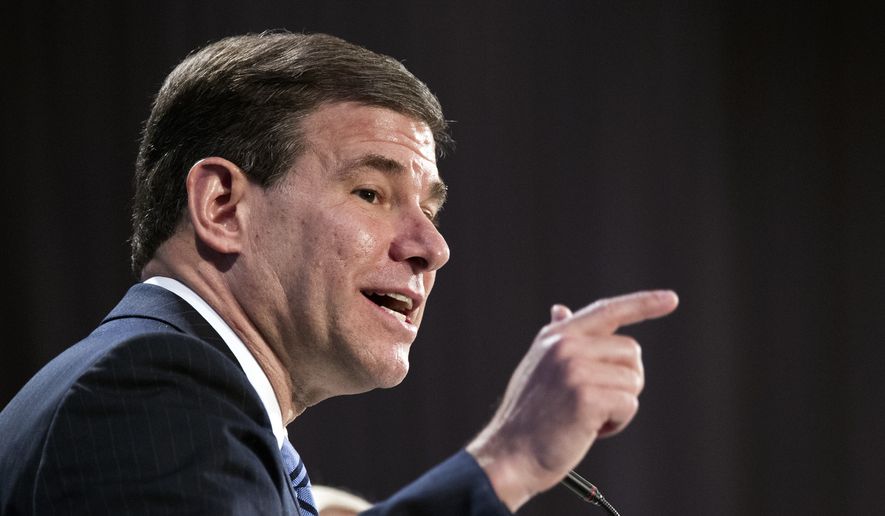OPINION:
It’s rumored that 11th Circuit Judge William Pryor is on the short-list to fill the late Supreme Court Justice Antonin Scalia’s seat.
President Trump announced on Tuesday he would name his Supreme Court nominee next week, and Judge Pryor, 54, was seen in the halls of Trump Tower earlier this month. His name was also on Mr. Trump’s list of 21 potential conservative nominees.
The choice, no doubt, will please pro-life conservatives. Judge Pryor’s called the Supreme Court’s Roe v. Wade decision legalizing abortion the “worst abomination of constitutional law in our history” and has voted against the Obamacare contraceptive mandate.
He’s also been a champion for religious liberty. The SCOTUS blog, which reviewed his record, said Judge Pryor “has consistently — although not uniformly — ruled in favor of parties raising religious liberty claims,” and he “wrote a lengthy opinion upholding a county’s practice of opening its meetings with a prayer.”
He’s also shown he’s a law-and-order type of judge — even if that goes against his personal beliefs.
While serving as the attorney general of Alabama, Judge Pryor famously removed Alabama Chief Justice Roy Moore from the bench for refusing to obey a federal court order to remove a Ten Commandments monument from the state judicial building.
Although it was reported that Judge Pryor believed the monument was constitutional, he didn’t believe Judge Moore had the right to refuse a federal court order.
It’s also been reported, and drives the liberal left wild, that Judge Pryor rearranged a family vacation to Disney World so it wouldn’t coincide with the annual “Gay Day” and wrote a lengthy opinion defending the legality of anti-sodomy laws in Texas, based on federalism.
It’s his rulings that benefited the LGBTQ community, which will surely cause a fluster among some within the GOP — but it shouldn’t.
Indeed, Judge Pryor has already come under fire from the Judicial Action Group (JAG), which have taken aim at his rulings for the transgender and gay community, saying his record creates the “likelihood he would not be a constitutionalist on the Supreme Court.”
That’s nonsense.
One of Judge Pryor’s rulings that they take issue with, is a case where a biological man, called Vandy Beth Glenn, sued his former supervisor at the Georgia General Assembly’s Office of Legal Counsel for sex discrimination on the grounds he was unfairly fired because of his decision to transition to a woman.
According to John Malcolm, the director of the Heritage Foundation’s Edwin Meese III Center for Legal and Judicial Studies, Mr. Glenn’s supervisor “conceded that his decision to fire Glenn was based on the ’sheer fact of the transition’ and that he considered it ’unsettling’ and ’unnatural’ for Glenn to show up for work dressed in women’s clothing.”
The district court ruled in Mr. Glenn’s favor, and Judge Pryor voted to uphold the ruling.
Mr. Malcom argues Judge Pryor’s decision “relied extensively” on Supreme Court precedent, which “held that anti-discrimination laws apply not just to discrimination on the basis of biological sex, but also to discrimination on the basis of gender stereotyping.”
His ruling was also in line with other federal courts, Mr. Malcolm argues, which have started to recognize that federal anti-discrimination laws do protect transgender persons against sexual discrimination.
That’s not activism, that’s ensuring every American is protected equally under the law.
The other pro-LGBT ruling that may have some conservatives up in arms, was based on a procedural issue, Mr. Malcolm points out.
A student wanted to form a Gay-Straight Alliance at their school, which was rejected by the school board. The student sued the school for violating student’s rights, and the case was dismissed in a lower court.
Judge Pryor sided with the student, arguing he or she should get their day in court — nothing more, nothing less. No value judgments or ideological views were applied to the case, Judge Pryor merely followed the rule of law.
Supreme Court justices aren’t kings — the late Scalia made that clear. They need to make their decisions based on the law as it stands in precedent, and leave the politics to the legislature.
Sometimes that may lead to decisions that they personally don’t agree with, and that’s fine. It’s what all conservatives should want — the rule of law, as originally intended, upheld — no matter who you are, or what you believe.




Please read our comment policy before commenting.